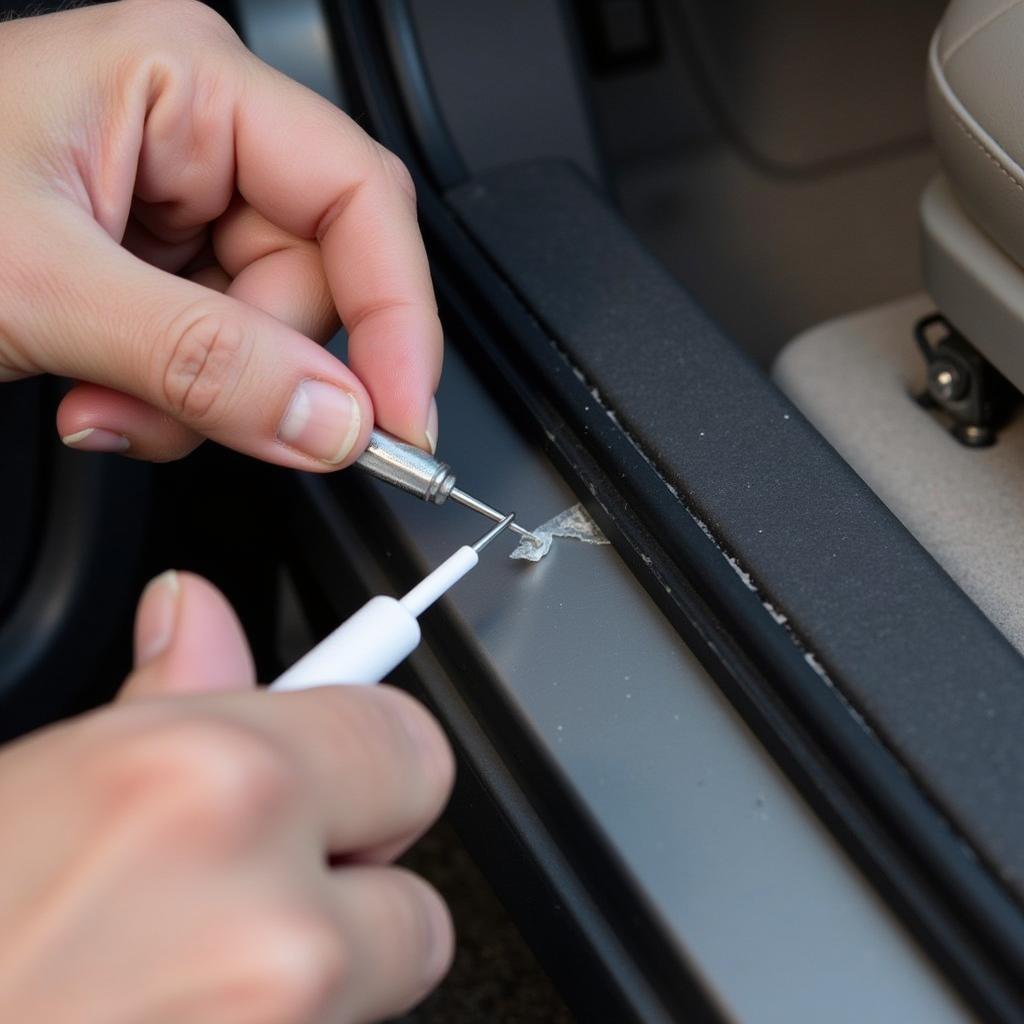A rattling engine noise can be unsettling and indicate a potential problem with your vehicle. This comprehensive guide will help you diagnose and potentially fix that annoying rattle, saving you time and money.
Common Causes of Rattling Engine Noise
Engine rattles can stem from a variety of issues, ranging from simple fixes to more complex problems. Identifying the source is the first step towards resolving the issue. Loose or worn components are often the culprits, such as heat shields, exhaust system parts, or even accessories like the alternator or power steering pump. More serious causes could include problems within the engine itself, like low oil pressure or worn bearings.
If you’re experiencing difficulty fixing your car’s window, our guide on how to fix car door window can provide step-by-step instructions.
Why is my engine rattling when I accelerate?
Rattling noises that increase with acceleration often point towards issues related to the engine’s load. This could be due to problems with the timing chain, worn-out tensioner pulleys, or even a failing catalytic converter.
Diagnosing the Rattle: A Step-by-Step Guide
- Listen Carefully: Pay close attention to the type of rattle, its frequency, and when it occurs. Does it happen when idling, accelerating, or at specific speeds?
- Visual Inspection: Open the hood and visually inspect the engine bay for loose components, damaged heat shields, or worn belts.
- Use a Stethoscope: A mechanic’s stethoscope can help pinpoint the source of the rattle. Place the probe on different engine components while the engine is running to isolate the noise.
- Check Fluid Levels: Low oil levels can cause significant engine damage and rattling noises. Ensure your oil level is within the recommended range.
What does a serious engine rattle sound like?
A serious engine rattle is often louder, deeper, and more consistent than a minor one. It may be accompanied by other symptoms like decreased performance, increased oil consumption, or warning lights on the dashboard. Don’t hesitate to seek professional help if you suspect a serious problem.
Fixing Common Rattling Engine Problems
Addressing a rattling engine noise can range from simple DIY fixes to more involved repairs requiring professional assistance. Let’s explore some common solutions:
- Tighten Loose Components: Check for loose bolts or screws on heat shields, exhaust system parts, and accessories. Tightening them may resolve the rattle.
- Replace Worn Parts: Worn belts, tensioners, or pulleys should be replaced promptly to prevent further damage and restore smooth engine operation.
- Address Oil Pressure Issues: If low oil pressure is the culprit, an oil change or engine repair might be necessary.
If you’re having issues with your car’s speakers, our guide on how to fix a busted speaker in a car can help you diagnose and resolve the problem.
“Regular maintenance and timely repairs are crucial for preventing engine problems,” says John Miller, a seasoned automotive engineer with over 20 years of experience. “Addressing minor issues early can prevent them from escalating into major, costly repairs.”
How can I prevent engine rattling noises?
Regular maintenance, including oil changes, belt replacements, and inspections, is the best way to prevent engine rattling noises.
Seeking Professional Help
While some rattling engine noises can be addressed with simple DIY fixes, others require the expertise of a qualified mechanic. Don’t hesitate to seek professional help if:
- You’re unable to identify the source of the rattle
- The noise worsens over time
- The rattle is accompanied by other symptoms like performance issues or warning lights
“Ignoring a persistent engine rattle can lead to significant engine damage and costly repairs down the road,” warns Sarah Chen, a certified mechanic with a decade of experience in automotive diagnostics. “A professional diagnosis can pinpoint the issue and prevent further complications.” If you are dealing with diagnostics issues, fix it car diagnostics might be helpful. For those with a bicycle rack problem, how to fix cycle stand on car might offer some solutions.
Conclusion
Addressing How To Fix Rattling Engine Noise In Your Car involves careful listening, visual inspection, and sometimes professional assistance. By understanding the potential causes and following the steps outlined in this guide, you can diagnose and fix the problem, ensuring smooth and reliable engine performance. Contact AutoTipPro at +1 (641) 206-8880 or visit our office at 500 N St Mary’s St, San Antonio, TX 78205, United States for further assistance.
If you are looking to improve the fuel efficiency of your older vehicle, how to fix an old car engine gas milage might provide valuable insights.





Leave a Reply